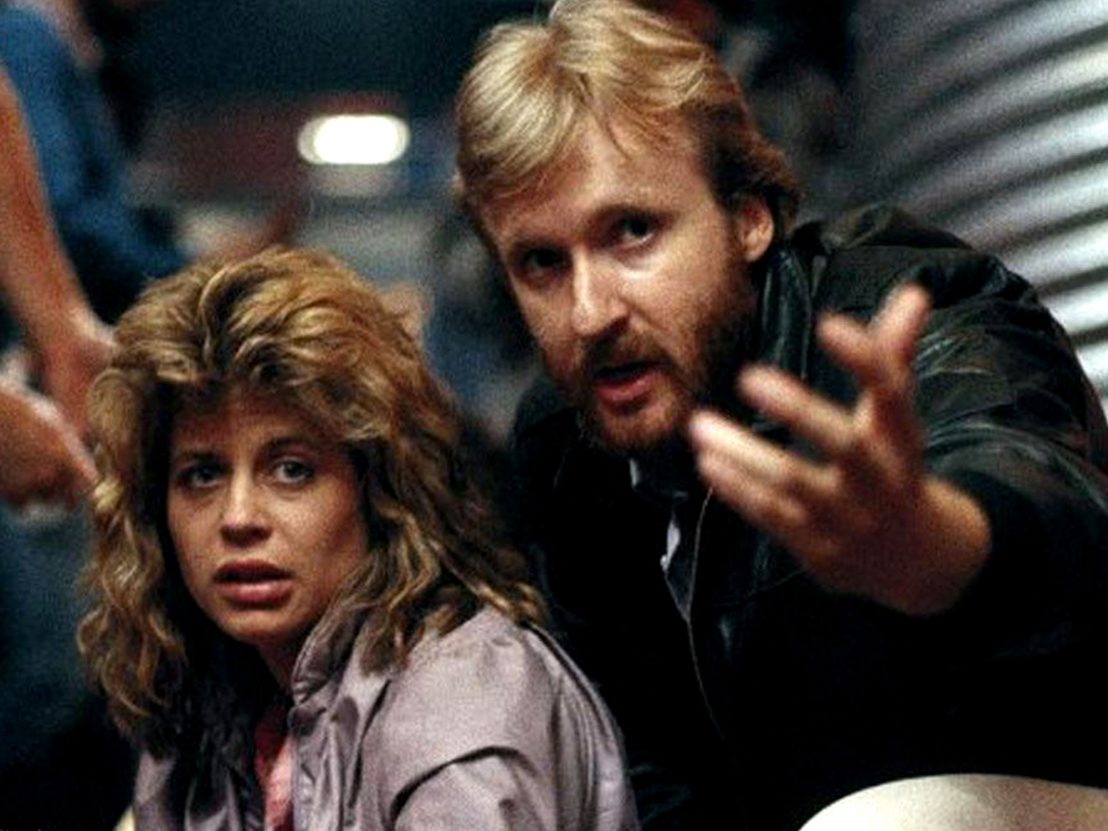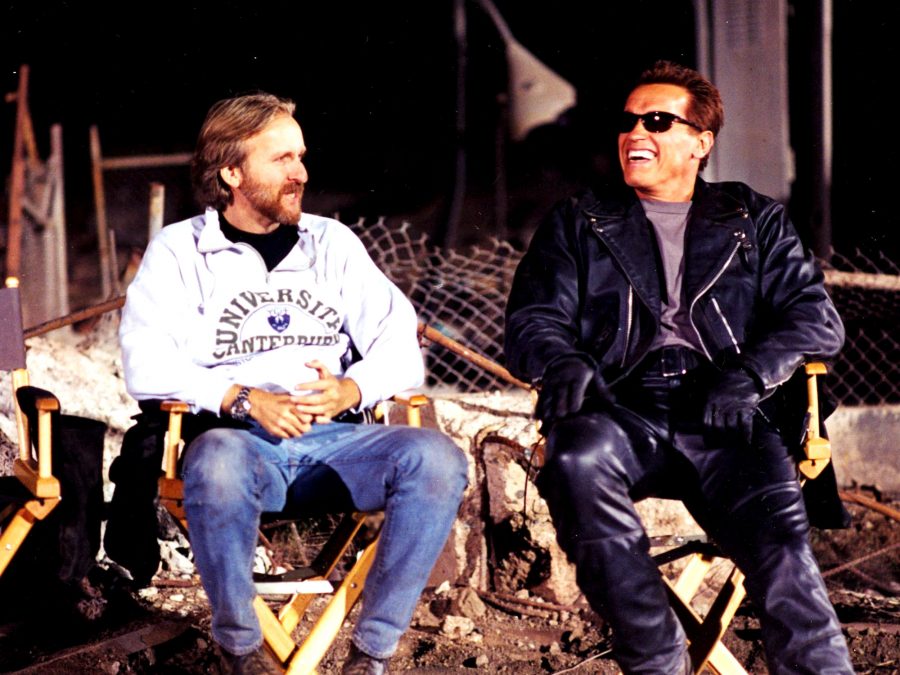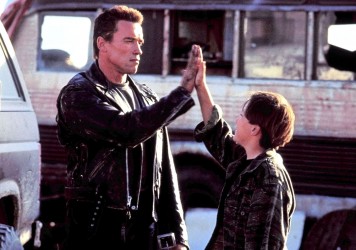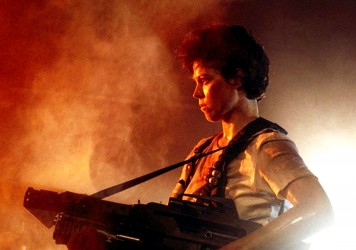
James Cameron appears to have taken a pitying glance at the popular movie franchise he launched in 1984, stopping short of reaching out and declaring, Kyle Reese-style, “Come with me if you want to live.”
He’s been busy of late working on his multiple Avatar sequels, so in all likelihood he won’t be writing and directing a new Terminator film anytime soon. In 2019, however, the rights revert to him – the original owner – and he’s mad keen on shepherding the juggernaut sci-fi property back to health. He wants Deadpool’s Tim Miller to take charge of what is already being billed as a reboot/final chapter.
Before their respective releases, Cameron had nothing but kind things to say about Terminator 3: Rise of the Machines, Terminator Salvation and Terminator Genisys, even going on camera in the case of the latter to convince us that this time the filmmakers had got it right. Fans have every right to be wary of being bullshitted again, because let’s face it, the Terminator mythology (including the Sarah Connor Chronicles TV show) has become a gigantic mess post-Cameron. The fates of numerous failed sequels would be a cautionary tale if Hollywood ever learned its lessons. Instead, producers simply hit the reboot button and hope for a different outcome.
Both The Terminator and Terminator 2: Judgement Day are major Hollywood success stories precisely because of their Jim Cameron-ness. It’s not a stretch to suggest that he’s the only director who could have pulled off such a feat. T3, Terminator Salvation and Terminator Genisys all suffer through a lack of creative input from the franchise’s visionary creator, the guy who fever-dreamed a metal skeleton clutching a bunch of knives (The Terminator is essentially a sci-fi twist on a slasher movie). In his absence, other directors have pissed in the soup, to borrow Cameron’s own charming turn of phrase.
The first two Terminator films work well as a concise two-part story, aided by two especially strong performances from Arnold Schwarzenegger. For our money, T2 is Arnie’s finest hour, the Austrian Oak humanising the monster in the style of James Whale’s Bride of Frankenstein. In 1991, the switcheroo from Big Bad to Big Lug was unexpected and inspired. By 2003, the shtick was getting stale, the comedic beats not quite having the same effect as before. In Terminator Genisys, it’s a routine absolutely riddled with maggots: at one point Emilia Clarke’s Sarah Connor refers to the T-800 as “Pops”, and the reason given for the machine appearing older is that Skynet used real human skin cells on their machines.

It’s not just the repeated flogging of a dead horse, the sequels post-T2 wreck the narrative by manipulating further the idea of predestination and the casual loop to justify their existence. If you look too closely at the story dynamics and time-travel theories, even at the centre of Cameron’s own lauded films, they fall inward like a collapsing pastry. Cameron knew this, but he also knew that most audiences wouldn’t feverishly obsess over the details (he wasn’t quite visionary enough to foresee the rise of message forums which would exhaustively deconstruct such points). It just had to sound plausible and cool enough for the viewer to climb on board and enjoy the thrills.
So how can Cameron rescue the Terminator franchise? Our first suggestion would be to ditch Arnie and rein in the comedy. The T-800’s classic one-liners (“I’ll be back”, “Hasta la vista, baby”) – let’s forget all that. The uncomfortable truth is that Arnie has become a millstone around the franchise’s neck. The same thing happened with Ripley in the Alien franchise, and Ridley Scott’s upcoming Alien: Covenant looks all the more promising for having seemingly left Sigourney Weaver on the sidelines.
The next Terminator film should also follow the lead of Neill Blomkamp’s currently postponed Alien sequel by pretending that everything after T2 was just a bad dream. Didn’t happen, move along, nothing to see here. That way, Cameron can truly take ownership of the timeline and bring Sarah Connor back in a way that doesn’t feel forced. The chase thriller element is bust, too. But the tech-noir nightmare vibe of T1 hasn’t really been touched upon since. The tone has gotten increasingly lighter. Why not return to the dark?
One lingering problem is that everything is tied up (perhaps a little too) neatly at the end of T2: the liquid metal T-1000 is destroyed; the surviving T-800 arm and processing chip from T1 is chucked into the furnace; and T2’s reprogrammed T-800 makes the ultimate sacrifice. Cameron has said that he wants to further explore humankind’s relationship to technology and how willingly we give ourselves over to it. He’s right about that, but the trick is to turn these highfalutin concerns into a blockbuster filled with great action and genuine excitement, all the while providing a smart continuation of a story which didn’t really need extending in the first place.
It’s a toughie, but if anyone can get the franchise back on track, it’s James Cameron.
Published 1 Feb 2017

By Taylor Burns
James Cameron’s original and best Terminator sequel has always existed on its own spectacular terms.
By Dan Einav
The made-for-TV project will see the director explore his love of the genre.

By Lara C Cory
Thirty years on, Sigourney Weaver’s iconic hero stands as a defiant symbol of gender equality.